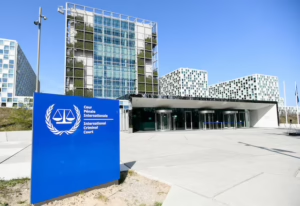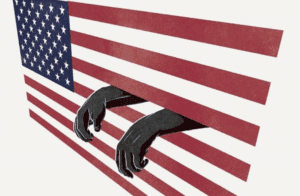 Karim Khan, prosecutor of the International Criminal Court (ICC), announced on May 20 that he has applied for arrest warrants for leaders of Hamas and Israel for war crimes and crimes against humanity over the October 7 attacks on Israel and the subsequent war in Gaza. A panel of judges will now consider Khan’s application for warrants for Yahya Sinwar, head of Hamas in the Gaza Strip; Mohammed Diab Ibrahim Al-Masri, commander-in-chief of the military wing of Hamas; Ismail Haniyeh, head of Hamas’ Political Bureau; Israeli Prime Minister Benjamin Netanyahu; and Israeli Minister of Defense Yoav Gallant.1
Karim Khan, prosecutor of the International Criminal Court (ICC), announced on May 20 that he has applied for arrest warrants for leaders of Hamas and Israel for war crimes and crimes against humanity over the October 7 attacks on Israel and the subsequent war in Gaza. A panel of judges will now consider Khan’s application for warrants for Yahya Sinwar, head of Hamas in the Gaza Strip; Mohammed Diab Ibrahim Al-Masri, commander-in-chief of the military wing of Hamas; Ismail Haniyeh, head of Hamas’ Political Bureau; Israeli Prime Minister Benjamin Netanyahu; and Israeli Minister of Defense Yoav Gallant.1
What Is the International Criminal Court?
The ICC is a criminal court located in The Hague, in the Netherlands, which brings cases against individuals for charges of genocide, war crimes, crimes against humanity, and crimes of aggression. It operates independently of other international organizations, such as the United Nations, and is separate from the UN International Court of Justice.2
The ICC was founded in 1998 by a treaty and entered into force in 2002. As of 2024, 124 countries are members of the court; Palestine is recognized as a member, but Israel, as well as the United States, Russia, China, and others, are not.3 If the ICC grants Khan’s application and issues arrest warrants for any of the five men, any country that is a member would have to arrest them and extradite them to The Hague.4
The ICC currently has arrest warrants for world leaders such as Russian President Vladimir Putin, for leading the invasion of Ukraine, and former Sudanese President Omar al-Bashir, for directing a campaign of mass killing and rape in the Darfur region.5
What Are the Charges?
The charges against Sinwar, Haniyeh, and al-Masri include “extermination, murder, taking of hostages, rape, and sexual assault in detention.” Hamas militants killed approximately 1,200 people and took at least 245 hostages in the October 7 attack on Israel. The charges against Netanyahu and Gallant include “causing extermination, causing starvation as a method of war, including the denial of humanitarian relief supplies, deliberately targeting civilians in conflict.” When announcing the application, Khan said, “The fact that Hamas fighters need water doesn’t justify denying water from all the civilian population of Gaza.” The Ministry of Health in Gaza estimates that more than 35,500 Palestinians have been killed and more than 79,000 have been wounded in Gaza since October 7, but outside organizations have not been able to confirm those numbers.6
How Have World Leaders Responded?
Both Israeli and Hamas leaders have condemned Khan’s application. Netanyahu said the action was meant to target all of Israel. “I reject with disgust the comparison of the prosecutor in the Hague between democratic Israel and the mass murderers of Hamas,” he said. Hamas said in a statement that it “strongly condemns the attempts of the ICC Prosecutor to equate victims with aggressors by issuing arrest warrants against a number of Palestinian resistance leaders without legal basis.”7
In the United States, President Joe Biden issued a statement in defense of Israel. “Let me be clear: Whatever this prosecutor might imply, there is no equivalence—none—between Israel and Hamas,” he said. “We will always stand with Israel against threats to its security.”8
Congressional Republicans have also condemned the ICC’s arrest warrants. Speaker of the House Mike Johnson (R-La.) said the chamber may vote on sanctions against the ICC for seeking an arrest warrant against Netanyahu.9 Rep. Elise Stefanik (R-N.Y.), leader of the House Republican Conference, said, “The ICC is an illegitimate court that equivocates a peaceful nation protecting its right to exist with radical terror groups that commit genocide.”10
Not all Democrats agree with President Biden, however. Sen. Bernie Sanders (I-Vt.), who caucuses with Democrats, said in a statement, “The ICC prosecutor is right to take these actions. These arrest warrants may or may not be carried out, but it is imperative that the global community uphold international law. Without these standards of decency and morality, this planet may rapidly descend into anarchy, never-ending wars, and barbarism.”11 Rep. Mark Pocan (D-Wis.) said, “If Netanyahu comes to address Congress, I would be more than glad to show the ICC the way to the House floor to issue that warrant.”
International rights organizations such as Amnesty International and Human Rights Watch have released statements in favor of the ICC’s actions.12 Support is split in Europe, with leaders in France, Germany, and Belgium affirming the actions of the ICC and those of the United Kingdom and Czech Republic issuing press releases against the prosecutor’s inclusion of Israel with Hamas. The United States’ neighbor, Mexico, supports an investigation by the ICC.13 As of May 21, Canadian Prime Minister Justin Trudeau had not released a statement about the action.14
What Happens Next?
The ICC’s Pre-Trial Chamber will assess whether there are reasonable grounds to believe that the accused have committed a crime within the ICC’s jurisdiction. In past cases, the Pre-Trial Chamber has taken several months to decide whether to issue a warrant, and security experts expect the same for this case. The ICC does not have its own police force; therefore, it must rely on member countries to enforce the arrest warrants that it issues or the suspect to present themselves to the ICC voluntarily.15
Discussion Questions
- Do you agree or disagree with the ICC’s decision to seek arrest warrants for Israeli and Hamas leaders? Explain your reasoning.
- If arrest warrants are issued, do you think the United States should help enforce them? Why or why not?
- If a world leader commits atrocities, how should we hold them accountable?
Other Resources
- Read the full statement by Khan or view an interview with him.
- For a detailed explanation of the ICC, see the Council on Foreign Relations: The Role of the International Criminal Court.
As always, we encourage you to join the discussion with your comments or questions below.
Close Up is proud to be the nation’s leading nonprofit civic education organization, working with schools and districts across the country since 1971. If you would like to partner with us or learn more about our experiential learning programs, professional development, or curriculum design and consulting, contact us today!
Sources









